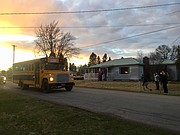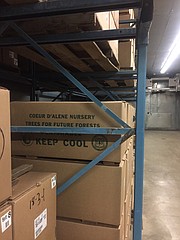LITTLE RELIEF for GRIEF
Pandemic has changed funeral service rules
Yates Funeral Home in Coeur d’Alene has been a family owned and operated business since World War II. Three generations of Yates have provided funeral services to people in North Idaho.
Dexter Yates is one of the current funeral directors. Like many, he finds the COVID-19 pandemic unprecedented in modern history.
“I’ve never heard anything equal to this in terms of a disease,” Yates said, including in stories handed down through his family.
Yates’ parents lived through the Great Depression. His mother was a nurse and his father was a medic in the U.S. Navy during World War II.
His mother’s family had a dairy farm in the Dakotas. During the Great Depression the family lost everything it had. So the family loaded 10 kids onto the running boards of its Model T Ford and drove west to Yakima, where the family had heard the fruit falling off the trees was free.
“They could eat that way,” Yates said.
Yates speaks in the compassionate and competent manner of someone accustomed to grief and to the profound importance of family stories.
“Each family that walks through our door is different and special,” Yates said. “Each family has their own needs.”
Funeral home directors and religious leaders alike are struggling during the pandemic to meet the needs of those grieving the loss of a loved one.
“I don’t have all the answers,” Yates said. “We are just continuing to do what we’ve been taught to do and do it safely, providing as much support as we can to the family.”
On March 19, the Department of Homeland Security issued guidance to states naming mortuary workers as critical infrastructure workers. Idaho adopted the DHS recommendation, exempting these workers from a stay-at-home-order issued last week.
“Every day I come to work it's different,” Yates said.
Thirteen funeral and memorial services for individuals through Yates Funeral Home have been postponed. No services are allowed indoors in Idaho. Yates Funeral Home was recently turned away from a service in Spokane, as Washington outlawed graveside services during the pandemic.
“We don’t know how bad it's going to get here,” Yates said.
The funeral home has enough storage for the time being, but is concerned if the disease progresses in the area. They’re trying to learn from what’s being done in other states to adapt and prepare.
“We provide the same level of service we’ve always provided,” Yates said, although he acknowledged how difficult it can be for families that do not have the immediate comfort and ritual of a funeral.
Almost all world religions observe a death by bringing those in mourning food and nourishment. So much of grief is tied up in physically being present with those who have suffered a loss. In the Jewish faith, families sit Shiva for seven days, as they accept the comfort of others. In Muslim families, their faith requires three days of mourning, where the family receives visitors and food. In Catholic traditions, the family sits through a wake, praying the rosary, usually the evening before the funeral Mass. It serves as a time for people to gather to comfort those in mourning.
Yates said clergy can still provide comfort to families, although they can provide only limited services during the pandemic.
“We are responsible for the care of the deceased,” Yates said. “We are considered first responders. Beyond that, we are limited by regulations now.”
Yates Funeral Home, English Funeral Home, and Bell Tower Funeral Home provide morgue and crematory services in Kootenai County. In the event of a mass fatality between 5-20 people, the county would activate an emergency plan, coordinating storage with these three facilities, according to Kootenai County Coroner Dr. Warren Keene.
In the event of greater fatalities or lack of available storage, the president of the United States can activate the Disaster Mortuary Operational Response Teams (DMORT). In Kootenai County, the Idaho Panhandle National Forests Coeur d’Alene Nursery would provide additional morgue storage in the event the DMORT was activated.
“Most mortuaries are between 38-39 degrees Fahrenheit,” Keene said. “It doesn’t stop decomposition, but it slows it down enough.”
The nursery has 10 refrigerated storage areas for overwintering tree starts.
“It’s incredibly unlikely to happen, to run out of space,” Keene said. “Most people now choose cremations.”
With 50 percent of deceased persons being cremated, Keene said even with postponed burials, the county will not fill its storage capacity.
“As always our calling is to assist the living while caring for the person who passed away,” said Eric English, the mortician at English Funeral Chapels. “Like funeral homes across the country and the world, we are making changes daily.”
English is saddened that people dying of COVID-19 are dying alone.
“There is a large group of the population going through a death and they won't be able to grieve in the way they want to,” English said.
He encourages families and the community to express their grief in whatever means are safe during this time, by calling, posting through the chapel website, or by mailing a sympathy card.









